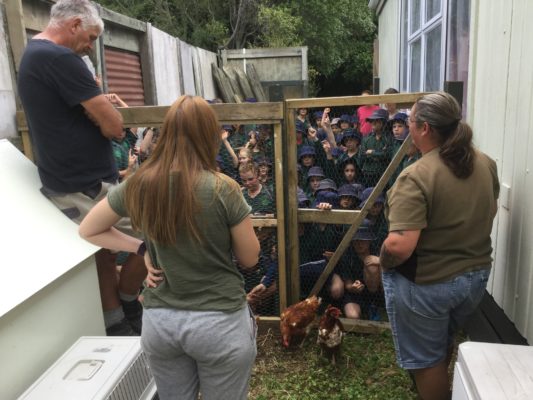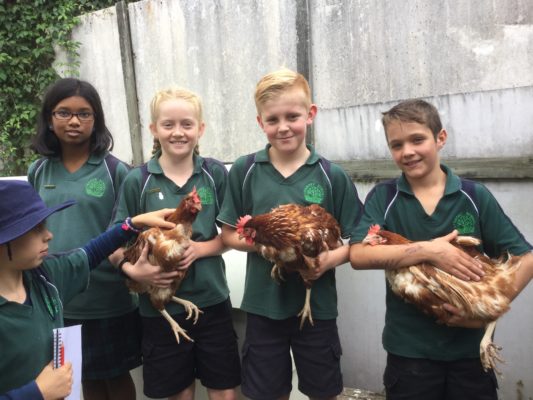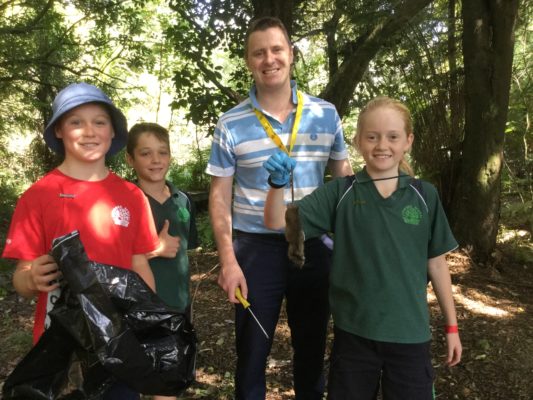Last term Lynmore School in Rotorua took delivery of 10 rescue hens. “It was pretty cool,” says teacher Andrew Doyle. “They’re ex-battery hens. The rescuer rehabilitated them for a week or so, then we got them. They’re laying well. They pay their own way – laying about 6 eggs per day. We sell the eggs and use the money to buy things like native plants.”

“It was pretty cool,” says teacher Andrew Doyle. “They’re ex-battery hens. The rescuer rehabilitated them for a week or so, then we got them. They’re laying well. They pay their own way – laying about 6 eggs per day. We sell the eggs and use the money to buy things like native plants.”
The hens are fed with an automatic feeder so that they don’t need anyone to feed them at the weekend and so that there’s no easy food access to attract rats.
“We’ve got 2 home-made traps in the chicken area but have only caught 1 rat where the chickens live. We’ve just installed a Goodnature A24 trap using our Kiwibank Predator Free Schools grant, so may move the home-made traps out into the bush area,” he adds. “We’ve got an A12 trap too – that will go in next week.”

Lynmore School is in an urban area, but includes a large area of native reserve known as Waitawa Bush.
“There are a lot of native trees and some redwoods,” says Andrew. “A stream runs through the reserve and there are gates between the reserve and the school playground. We’ve got 2 DOC 200 traps and 4 of our own, home-made traps in the bush area and have a roster so that a group from our Enviro Club checks the traps each lunchtime.”
The ‘home-made’ traps were made the pupils themselves aided by school caretaker, Gary Huitema who runs the Enviro Club with Andrew.
“We used a trap-box template provided by PFNZ Trust. We bought the wood, made the boxes and installed Victor rat traps,” says Andrew. “Usually we catch about 1 rat per week, but we had a bumper week last week with 5 rats and 1 hedgehog. We took the traps out during the school holidays, so this was the first week they were back in the bush.”

The pupils document the results of their trapping operation. They’ve also carried out chew card surveys and tracking tunnel monitoring and have been learning about endemic wildlife and pest species as part of their classroom work.
“There are 700 kids on the roll at Lynmore, with about 30 directly involved in the lunchtime Enviro Club group – mainly Year 6s. It all ties in with their learning about what we can do to increase native birds,” Andrew says.
The Kiwibank Predator Free Schools programme links in with the Enviroschools programme which Lynmore was already participating in, with both programmes contributing to the wellbeing of Waitawa Reserve.
“The stream that runs through the reserve needs more trees for its banks. Through our paper recycling programme we’re due to get 41 trees donated to us. Some will go in the school grounds but most will be native trees for the reserve, says Andrew.”
With predators controlled and more natives planted the birdlife in Waitawa Bush will surely increase.
“We spotted a kaka there last year which is really unusual,” says Andrew. “We haven’t done a proper bird survey yet but that’s something I’d like to do soon.”

